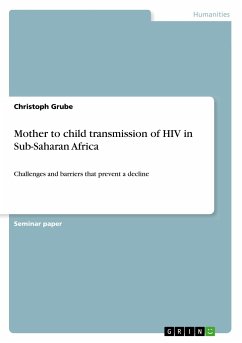
Sexual Violence as a Weapon of War in Sub-Saharan African Conflicts

PAYBACK Punkte
0 °P sammeln!
Research Paper (postgraduate) from the year 2010 in the subject Sociology - Gender Studies, grade: A, London School of Hygiene & Tropical Medicine (-), course: Diploma in Tropical Nursing, language: English, abstract: Gender based violence (GBV) is a complex, multidimensional problem which the World Health Organisation (WHO, 2005) describes as a 'universal phenomenon'. So much so, that GBV is recognised as a serious human rights and public health problem that concerns all members of society, (Murray and Lopez, 1996, Inter-Agency Standing Committee, 2005). Subsequently, GBV has been incorporate...
Research Paper (postgraduate) from the year 2010 in the subject Sociology - Gender Studies, grade: A, London School of Hygiene & Tropical Medicine (-), course: Diploma in Tropical Nursing, language: English, abstract: Gender based violence (GBV) is a complex, multidimensional problem which the World Health Organisation (WHO, 2005) describes as a 'universal phenomenon'. So much so, that GBV is recognised as a serious human rights and public health problem that concerns all members of society, (Murray and Lopez, 1996, Inter-Agency Standing Committee, 2005). Subsequently, GBV has been incorporated into the Millennium Development Goals, where reducing GBV will have a direct effect on achieving Goal three; the promotion of gender equality and empowerment of women. This issue has gained international attention, as a direct result of civil conflicts in Bosnia and Rwanda, where human rights abuses were seen violated on a magnitude never before recorded and described as acts of genocide,(United Nations Security Council, UNSC, 1999). In Rwanda, it is thought that about 500,000 women were raped by Hutu militia, (Human Rights Watch, 1996). Further atrocities have been documented in Sierra Leone, where approximately 50,000 to 64,000 internally displaced women have reported war-related sexual assaults (Physicians for Human Rights, 2002). In Kenya, following the disputed presidential elections in 2008, violence erupted which saw acts of sexual violence (SV), such as, gang rape and mutilation. United Nations (UN, 2007) reports suggest that 27, 000 rapes occurred in one region of the Democratic Republic of Congo (DRC) in 2007. SV has been predominant in many other conflicts such as in Uganda (Giller et al, 1991) and Sudan (Amnesty International, 2004). Research on this area tends to use the terms GBV and SV interchangeably and cannot be explored fully in this paper. There is limited research focusing on violence against males, and therefore this paper will concentrate on SV against women specifically. This paper will discuss why SV has become part of warfare in Sub-Saharan Africa and then examine the treatment programmes aimed at survivors, in particular focusing on the barriers to effective implementation of programmes.













